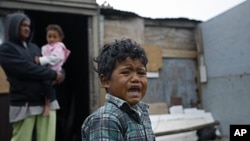Both local and international investors have been slow to invest in South Africa since its economy began to recover in 2009 from the global recession.
South African corporate cash deposits are currently about $63 billion, and experts say this is an indication that companies are hesitant to expand current enterprises or invest in new projects. In addition there have been few major international investments in the country in the past three years.
South Africa's economy experienced nearly two decades of uninterrupted economic growth until the global economic crisis in 2008.
Constraints
But experts say problems with capacity - or a lack of it, in the country's rail network and in its electricity supply - have become a drag on further economic expansion, especially in the key mining and manufacturing sectors.
In early 2008, national power company Eskom embarked on a program of rolling blackouts due to unexpected plant failures, and the government was forced to admit it had vetoed earlier proposals to allow the state-owned enterprise to expand its capacity.
Cees Bruggermans, chief economist at First National Bank, says that electricity supply continues to be a major constraint for potential investors.
“We find on the supply side of the economy," said Bruggermans, "we have very specific South African constraints in the manner that electricity capacity is fully utilized, and for the time being it is not really capable of accommodating any additional electricity use, at least for the next two, three years - possibly longer depending on how quickly new capacity comes on stream,” said the economist.
Bruggermans says that these challenges have severely impacted the mining sector, which has not grown in a decade even though the country is resource rich with lots of reserves.
“And [there is] nothing more dramatic I think than our mining industry, which for the past ten years has basically not increased its production levels while worldwide of course we have had an enormous commodity boom."
In contrast, Bruggermans notes, mining interests in countries such as Australia, Chile, Brazil and Canada have expanded their operations substantially.
Labor laws
Some experts also say that labor in South Africa is both more expensive and less productive than that in other countries such as India and China.
Michael Bagraim, president of the Cape Chamber of Commerce and a labor lawyer, says the current labor laws in South Africa are a disincentive for investors.
“I get clients everyday who come to see me about the onerous labor laws and they look at the cost and the productivity of the South African worker and they try and weigh up cost against productivity and it looks like their mathematics are telling us that it is cheaper to invest elsewhere,” he said.
But Bagraim says that there have been recent cases where direct negotiations with unions have benefited companies, such as in the severely-threatened clothing industry.
“A perfect example is the clothing industry, which is dying in Cape Town. The clothing industry has now struck a deal between the manufacturers and COSATU and SACTWU in particular, the South African Clothing and Textile Workers Union, where entry workers would take a 30 percent knock less than their normal minimum wage. That has been agreed and it is put into place for one year, and already we are seeing results,” he said.
Economist Bruggermans says that South Africa is experiencing a slow start to its recovery, but expects that in time, companies will be stimulated toward investment.




